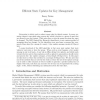Free Online Productivity Tools
i2Speak
i2Symbol
i2OCR
iTex2Img
iWeb2Print
iWeb2Shot
i2Type
iPdf2Split
iPdf2Merge
i2Bopomofo
i2Arabic
i2Style
i2Image
i2PDF
iLatex2Rtf
Sci2ools
122
Voted
CCS
2001
ACM
2001
ACM
Efficient State Updates for Key Management
Encryption is widely used to enforce usage rules for digital content. In many scenarios content is encrypted using a group key which is known to a group of users that are allowed to use the content. When users leave or join the group the group key must be changed. The LKH (Logical Key Hierarchy) algorithm is a very common method of managing these key changes. In this algorithm every user keeps a personal key composed of log n keys (for a group of n users). A key update message consists of O(log n) keys. A major drawback of the LKH algorithm is that users must update their state whenever users join or leave the group. When such an event happens a key update message is sent to all users. A user who is offline during t key updates, and which needs to learn the keys sent in these updates as well as update its personal key, should receive and process the t key update messages, of total length O(t log n) keys. In this paper we show how to reduce this overhead to a message of O(log t) keys. ...
Related Content
| Added | 23 Aug 2010 |
| Updated | 23 Aug 2010 |
| Type | Conference |
| Year | 2001 |
| Where | CCS |
| Authors | Benny Pinkas |
Comments (0)

